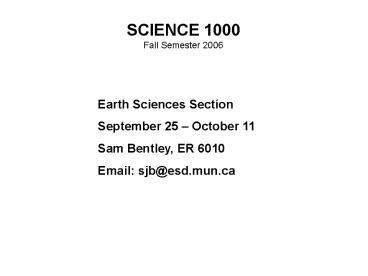SCIENCE 1000 PowerPoint PPT Presentation
1 / 17
Title: SCIENCE 1000
1
SCIENCE 1000 Fall Semester 2006
Earth Sciences Section September 25 October
11 Sam Bentley, ER 6010 Email sjb_at_esd.mun.ca
2
SCIENCE 1000 Fall Semester 2006
Reading 1 McPhee, John, 1998, Set Piece on
Geologic Time. In McPhee, J., Annals of the
Former World. Farrar, Strauss, and Giroux, p.
67-99. Hard copy in QEII library reserve.
3
We will attempt to cover the following Lecture
1 Intro to Earth Science Geologic Time Plate
Tectonics Lecture 2 The Wilson Cycle, the Rock
Cycle, Continents, and Ocean Basins Lecture 3
Evolution of Life Energy Resources Lecture 4
Mineral Resources Lecture 5 Climate Change,
Ancient and Modern Lecture 6 Geologic
Hazards Day 7 lecture test
4
I am a marine geologist/geological
oceanographer. What does that mean?
5
World Ocean Geological oceanography encompasses
most aspects of geology.Earths surface 70
oceanSurficial rocks 70 sediments, mostly
marine in origin
6
EARTH SCIENCES
- If the Sciences are viewed as a pyramid, then
Earth Sciences is at the top - I.e., It is built upon all the other sciences
Earth
Sciences
Chemistry
Biology
Mathematics
Physics
7
EARTH SCIENCES
- Aka Geology Study of the Geos (Earth)
- Geophysics Study of the physical properties of
Earth - Geochemistry Study of chemical properties of
Earth - Petrology Study of rocks Petros
- Paleontology Study of fossils and evolution
- Hydrology Study of water on Earth
- Biogeochemistry Study of the geochemical
properties of organisms - Etc.
8
EARTH SCIENCES
- Big difference between Earth Sciences and other
sciences is - TIME
- Geological processes very dependant on the Fourth
Dimension - Basically lots of things can happen given enough
time (the Impossible even?) - Realization of the impact of time lead to
development of the theory of Evolution
9
TIME
- Earth is 4.55 billion years old (4550 Million, or
Ma) - Shelled organisms (hard parts) 575 Ma
- Hominids 5 Ma
- Average Human Life Span 80 years
- One human generation 25 years
- Thus 182 million generations since Earth formed
!!!
10
(No Transcript)
11
(No Transcript)
12
Geological Time
- Ideas that Earth was very old are very recent
- Most religions have creation stories
- E.g. In 18th Century, the Bishop of Ussher
(Ireland) read the Bible in detail and concluded
that Earth was created on Oct. 23, 4004 BC, in
the evening (Later refined to 900 am). - That Earth was only thousands of years old was
entrenched dogma for a long time - Minor facts like the discovery of fossils in
rocks on top of the Alps were Proof of the
Biblical flood and Noahs Ark - In fact 18th century Early 19th century
geologists were divided into - a) Neptunists and
- b) Plutonists/Volcanists
13
- Neptunists believed that all rocks and landforms
were deposited from a universal ocean that
covered Earth - Plutonists, conversely, believed that all rocks
formed from molten lava e.g. they could see
volcanic rocks forming in Italy and elsewhere - What is the truth?
- Igneous rocks form from molten lava
- Sedimentary rocks from sedimentary material
(oceans, rivers, lakes, etc.) - Metamorphic rocks which form by subjecting other
rocks (igneous/sedimentary/metamorphic) to heat
and pressure and thus changing (metamorphosing)
them - Geological events ca. 18th century were noted as
very abrupt and dangerous to humans such as
earthquakes, volcanoes, etc.
14
Development of Modern Scientific Inquiry Where
does geology fit in?
Who are these people? Nicolaus Copernicus Galileo
Galilei Isaac Newton James Hutton Charles Darwin
15
- First big theory about Earth processes
- CATATROPHISM, modern earth formed by successive
catastrophes (like floods and eruptions) - James Hutton (1726-1797) was the father of
modern geology - He suggested that most geological processes, in
fact, took a very long time - So-called GRADUALISM
- This idea later led to the theory of
UNIFORMITARIANISM which stated that geological
processes occur at the same rates today as
through Earth history - Present is the key to the past in order to
understand ancient geological processes one
should study modern-day examples - There are of course exceptions, for instance we
are multicellular critters, but earliest Life was
simple single cells
16
James Hutton (1726-1797) and Geology
- At the time, most philosophers and the Church
calculated that the earth was created on Sunday
October 23, 4004 BC. - Hutton recognized that
- slow processes acting over very long time spans
can produce great change. - Erosion and sedimentation are slow processes
(Hadrians Wall looked pretty good after 1500
years of weathering.) - Sediments are deposited in flat-lying layers
- Sedimentary layers that are not horizontal must
have been moved by powerful forces over long time
spans - The same forces that deform sedimentary layers
tend to be accompanied by the production of high
temperatures and molten rock (magma at depth,
lava at the surface).
17
James Hutton, 1785 address to the Royal Society.
Uniformitarianism the greater part of our land
has been created by operations natural to this
globe. Mountain Building The same power of
extreme heat by which every different mineral
substance had been brought into a melted state
might be capable of . . . elevating the land
from the bottom of the ocean . . . Age of the
earth no vestige of a beginning, and no
prospect of an end.
Huttons angular unconformity at Siccar Point,
Berwickshire, Scotland Old Red Sandstone
(terrestrial) upon upright metamorphosed
mudstones (marine)

